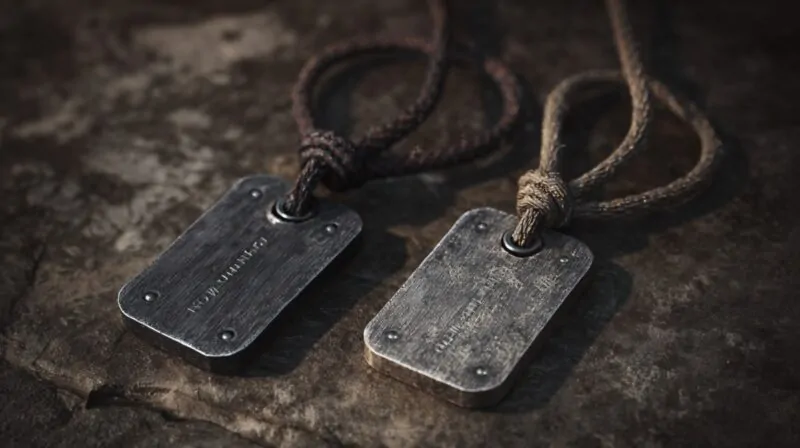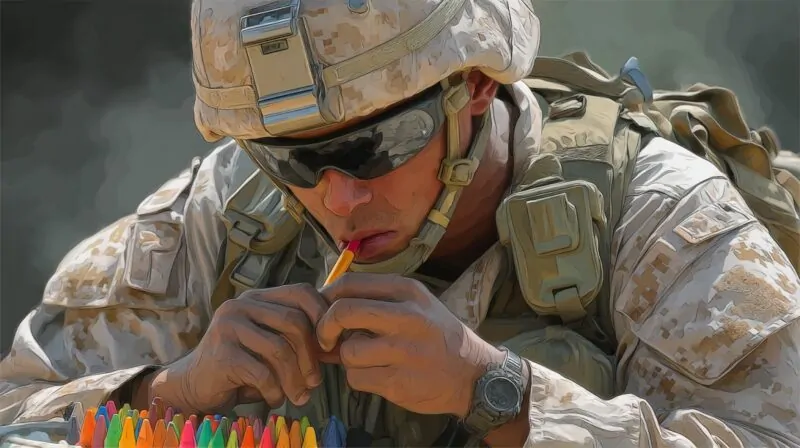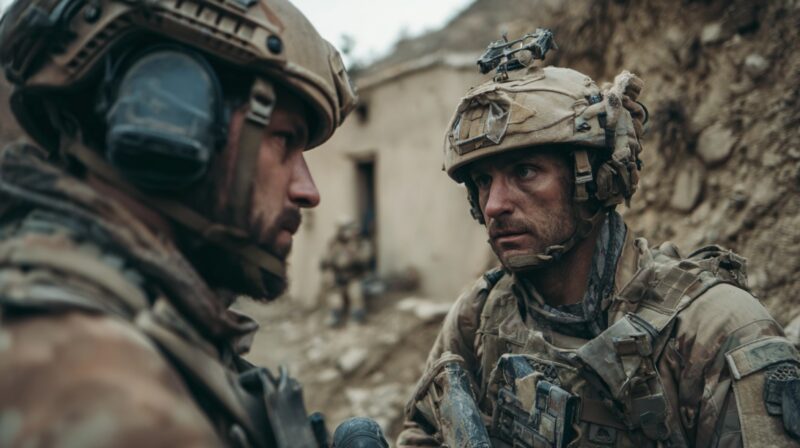The military enforces strict moral and legal standards to ensure that its recruits uphold the values of discipline, trust, and cohesion critical to its success. Certain criminal charges serve as barriers to enlistment, reflecting the importance placed on accountability and ethical behavior within the armed forces.
The selection process is designed to identify individuals who demonstrate integrity and responsibility, qualities that are essential in high-pressure and team-oriented environments.
By getting familiar with how different criminal charges may affect eligibility, prospective recruits can better prepare for the expectations and challenges of military service.
Table of Contents
ToggleTypes of Disqualifying Criminal Charges
- Felony offenses
- Domestic violence charges
- Drug-related offenses
- Sex crimes and sexual misconduct
- Financial misconduct
- Traffic and non-traffic misdemeanors
- Juvenile offenses
Felony Offenses

Felony offenses are among the most significant barriers to military enlistment due to their severity and the values they undermine.
These crimes demonstrate a profound breach of the ethical and behavioral standards the military requires for its recruits.
- Arson reflects a disregard for safety and property, posing a risk to the structure and resources of a military unit.
- Burglary indicates breaches in trust and integrity, qualities essential for handling sensitive information or assets in the armed forces.
- Aggravated Assault shows a history of violence and an inability to manage conflict constructively, jeopardizing the teamwork needed in high-stress environments.
- Manslaughter involves grave consequences of poor judgment, demonstrating challenges in making sound, responsible decisions under pressure.
These offenses are considered incompatible with the discipline, trustworthiness, and cohesion required to function effectively within the military.
Recruiters often see felony convictions as a reflection of an individual’s inability to adhere to strict military codes of conduct.
Domestic Violence Charges

Domestic violence criminal charges are a serious impediment to military enlistment, as they are subject to the Lautenberg Amendment, which prohibits individuals convicted of domestic violence offenses from possessing or handling firearms.
The prohibition directly impacts a fundamental aspect of military service, where the use of firearms and other weapons is often a necessary part of training and operational duties.
- Physical Abuse involves acts of violence that directly harm the safety of others, which is incompatible with the military’s emphasis on teamwork and mutual respect.
- Emotional Abuse encompasses behaviors such as manipulation or intimidation, eroding the emotional stability required for effective unit cohesion.
- Economic Abuse includes controlling or mismanaging a partner’s financial resources, reflecting poor decision-making.
The Lautenberg Amendment’s prohibition on firearm possession creates an operational barrier for those with domestic violence convictions.
In a military environment, where firearm proficiency is a basic requirement for most roles, such restrictions make enlistment nearly impossible without a waiver.
Drug-Related Offenses

Drug-related offenses are a significant barrier to military enlistment due to the serious implications they have on trust, reliability, and performance.
Engaging in activities such as selling, trafficking, or possessing illegal substances highlights behaviors that conflict with the discipline and ethical standards the military upholds.
These crimes raise concerns about the individual’s ability to function effectively in environments that demand clarity of mind, sound decision-making, and unwavering commitment to duty.
- Selling Drugs reflects a deliberate disregard for laws and social welfare, raising questions about an individual’s respect for authority and the safety of others in a close-knit team setting.
- Drug Trafficking demonstrates involvement in organized illegal activities, creating doubts about trustworthiness and the capacity to handle sensitive military responsibilities.
- Possession of Illegal Substances indicates potential personal struggles with substance abuse, which can impair judgment, readiness, and physical health.
The military views drug-related crimes as direct threats to combat readiness and unit cohesion. Substance abuse or distribution can compromise not only the individual’s performance but also the safety and effectiveness of their team.
Sex Crimes and Sexual Misconduct
Sex crimes and sexual misconduct are among the most strictly disqualifying offenses for military enlistment, reflecting the armed forces’ zero-tolerance stance on behavior that undermines respect, trust, and cohesion.
Crimes such as statutory rape, sexual assault, and other forms of sexual misconduct have profound implications, not only for individual victims but also for the integrity and functionality of a military unit.
- Statutory Rape involves sexual relations with a minor, regardless of consent, which reflects an inability to adhere to societal and legal boundaries.
- Sexual Assault constitutes an egregious violation of personal safety and dignity, highlighting serious lapses in judgment, self-control, and respect for others.
- Harassment or Exploitation includes unwanted advances, inappropriate communication, or exploitation, behaviors that severely damage trust within a team.
The military prioritizes unit cohesion and mutual respect, elements that are essential for effective teamwork in high-pressure environments. Individuals with convictions for sex crimes are seen as significant risks to these foundational values.
Such offenses not only harm the immediate victims but also erode morale, create divisions within units, and jeopardize the mission’s success.
Zero Tolerance Policy
Sexual misconduct is viewed as fundamentally incompatible with the military’s ethical standards.
Waivers for these offenses are rarely, if ever, considered, reflecting the gravity of such crimes.
Convictions often result in permanent disqualification, as they indicate a profound breach of trust and accountability.
Financial Misconduct

Financial misconduct, including crimes such as credit card fraud, embezzlement, and similar offenses, presents significant barriers to military enlistment.
These offenses signal a fundamental lack of trustworthiness, which is critical in an institution where recruits may be entrusted with sensitive information, financial resources, and valuable equipment.
Such behavior raises concerns about an individual’s ability to adhere to the principles of responsibility and accountability, which are foundational to military service.
- Credit Card Fraud demonstrates dishonesty and a willingness to exploit financial systems for personal gain.
- Embezzlement involves the theft of funds or assets, often through deceitful means, highlighting an inability to manage resources ethically.
- Check Fraud indicates a pattern of deceit and financial irresponsibility, which can compromise the integrity of financial transactions and operational trust within military systems.
These types of offenses directly conflict with the military’s emphasis on maintaining secure and reliable management of resources, making it difficult for individuals with such records to gain entry.
Traffic and Non-Traffic Misdemeanors
Traffic and non-traffic misdemeanors, though less severe than felonies, are criminal charges that can still influence eligibility for military enlistment.
- Individual’s judgment
- Reliability
- Ability to adhere to rules
While one isolated incident might be overlooked, repeated violations or a pattern of reckless behavior indicate deeper issues with accountability and discipline.
- Underage Drinking signals a disregard for laws and regulations, raising concerns about how an individual might respond to strict military protocols.
- Disorderly Conduct reflects impulsive or disruptive behavior that could hinder unit cohesion and operational effectiveness.
- Minor Traffic Violations show how consistent infractions such as speeding or reckless driving suggest a lack of responsibility and respect for rules.
Although these offenses are not as severe as felonies, their cumulative impact can negatively affect recruitment prospects. The military assesses not only the nature of the offenses but also the frequency and recency of such behaviors.
Juvenile Offenses
Crimes committed during adolescence can significantly impact military enlistment.
While juvenile offenses may be seen as mistakes of youth, they are still evaluated to ensure the candidate demonstrates the maturity and responsibility expected in service.
| Category | Key Points | Summary |
|---|---|---|
| Disclosure Requirements | All juvenile offenses, including sealed or expunged, must be disclosed. | Transparency prevents disqualification risks. |
| Assessment of Juvenile Records | Evaluates offense nature, age at offense, and time elapsed. | Older, non-violent offenses are less severe. |
| Indicators of Rehabilitation | Shows responsibility through employment, education, and service. | Evidence of growth improves enlistment chances. |
| Impact on Waiver Eligibility | Severity and frequency of offenses affect waivers. | Isolated incidents are more forgivable. |
Factors Influencing Waiver Approvals

Military recruiters carefully evaluate each waiver request based on a variety of criteria.
Decisions are made on a case-by-case basis, ensuring all aspects of an individual’s background and current circumstances are taken into account.
| Factor | Key Points | Impact |
|---|---|---|
| Severity of Offenses | Serious crimes hinder eligibility | Minor, reformed cases may be forgiven |
| Time Elapsed | Older offenses matter less | Recent crimes carry more weight |
| Civilian Adjustment | Job and education show growth | Success improves waiver chances |
| Staffing Needs | Flexibility rises during shortages | Waivers are easier when demand is high |
Supporting Documentation
Providing comprehensive and accurate documentation is a crucial part of the waiver request process for military enlistment.
Materials like these help demonstrate accountability, reform, and suitability for service.
Recruiters rely heavily on this evidence to assess the seriousness of the offense and the extent of the candidate’s efforts toward rehabilitation.
Court Records
Candidates must supply official court records to provide proof of their criminal charges, including details about charges, sentencing, and resolutions such as fines, probation, or case dismissals.
These records ensure transparency and allow recruiters to verify the facts surrounding the offense.
A complete history of legal outcomes is vital in evaluating the waiver request.
Letters of Recommendation
Endorsements from employers, educators, community leaders, or other respected individuals play an essential role.
These letters should highlight the candidate’s character, work ethic, and commitment to improvement.
For example, an employer might vouch for reliability and responsibility, while a community leader could attest to the candidate’s positive impact through volunteer work.
Evidence of Reformed Behavior
Documentation that demonstrates progress and a commitment to change is critical.
- Completion of rehabilitation or counseling programs addressing the underlying causes of the offense.
- Employment records show consistent work and professional growth.
- Educational achievements, such as diplomas, certifications, or training, reflect a dedication to self-improvement.
- Proof of involvement in community service or volunteer programs, showcasing a sense of responsibility and giving back to society.
Honesty and Disclosure During Recruitment

Being transparent about one’s criminal history is a crucial aspect of the military recruitment process.
The military prioritizes integrity and views honesty as a foundational trait of any service member.
Candidates who disclose their past offenses upfront are often given more consideration than those who attempt to hide their history.
Importance of Transparency
Full disclosure allows recruiters to evaluate the severity and context of past offenses fairly.
- Legal penalties and immediate disqualification.
- Even minor offenses that could have been waived may result in permanent disqualification due to dishonesty.
It demonstrates a willingness to take responsibility for past mistakes. Reflects the candidate’s commitment to upholding military values, such as accountability and trustworthiness.
Provides an opportunity for recruiters to consider waivers or exceptions if the candidate’s history and current behavior support rehabilitation.
The military conducts thorough background checks, including access to sealed and expunged records.
Attempting to conceal any offense undermines the trust required for a successful career in the armed forces. Fraudulent enlistment can result in discharge, fines, or even imprisonment.
This is why you should run a background check on yourself using tools like UnMask before applying. That way, you can see what would appear on your public records during the check and clarify things as required.
Comparison of Recruitment Standards Across Military Branches
Recruitment standards differ among the military branches, reflecting their distinct missions, operational requirements, and personnel needs.
While all branches uphold stringent criteria to ensure discipline and integrity, variations in leniency and waiver opportunities influence how criminal records are evaluated.
Here are the examples:
| Branch | Key Characteristics | Waiver Considerations |
|---|---|---|
| Army | Largest branch with diverse personnel needs. | More waivers for minor offenses, lenient during shortages. |
| Marine Corps | Strict standards, smaller elite force. | Waivers are rare and only for minor infractions. |
| Navy | Focuses on specialized roles like IT and engineering. | Waivers depend on offense severity and technical skills. |
| Air Force | High standards, emphasize advanced skills and education. | Flexible for technical expertise, with focus on accountability. |
| Coast Guard | Dual military and law enforcement role, strict standards. | Rare waivers, only for minor infractions. |
The Bottom Line
The military enforces strict moral and legal standards to maintain discipline, trust, and unity within its ranks. Certain criminal charges, particularly those involving violence, drug offenses, or significant misconduct, can act as significant barriers to enlistment.
However, the recruitment process also considers individual circumstances, offering some flexibility through waivers for less severe offenses or those committed long ago.
For individuals with a criminal record, meeting military standards may seem challenging, but with honesty, accountability, and effort to rebuild trust, it is possible to present a compelling case for enlistment.
Ultimately, the armed forces prioritize candidates without criminal charges, who exhibit discipline, integrity, and a commitment to the values essential for military service.
Sources
- National Library of Medicine – Conflict Management
- US Marshals – Lautenberg Amendment
- United Nations – What is Domestic Abuse
- National Library of Medicine – Sexual assault and posttraumatic stress disorder
- Sage Journals – Perceptions of Espoused Versus Enacted Culture Around Sexual Misconduct
- Research Gate – Credit card fraud and detection techniques
- DODReads – The Lost Art Of Military Recommendation Letters
- ProPublica – New Pentagon Rules Keep Many Military Court Records Secret
Related Posts:
- What Medications Can Disqualify You from the Coast Guard?
- How Old Can a Woman be to Join the Military? Joining…
- Joining the Coast Guard Reserve - Requirements and Benefits
- Can You Join the Army with Scoliosis? What You Need…
- Can You Take Legal Action Against the Military -…
- Can You Join the Military with ADHD? What to Know







